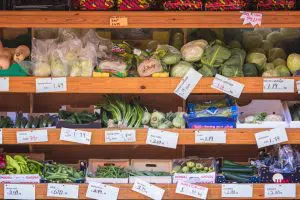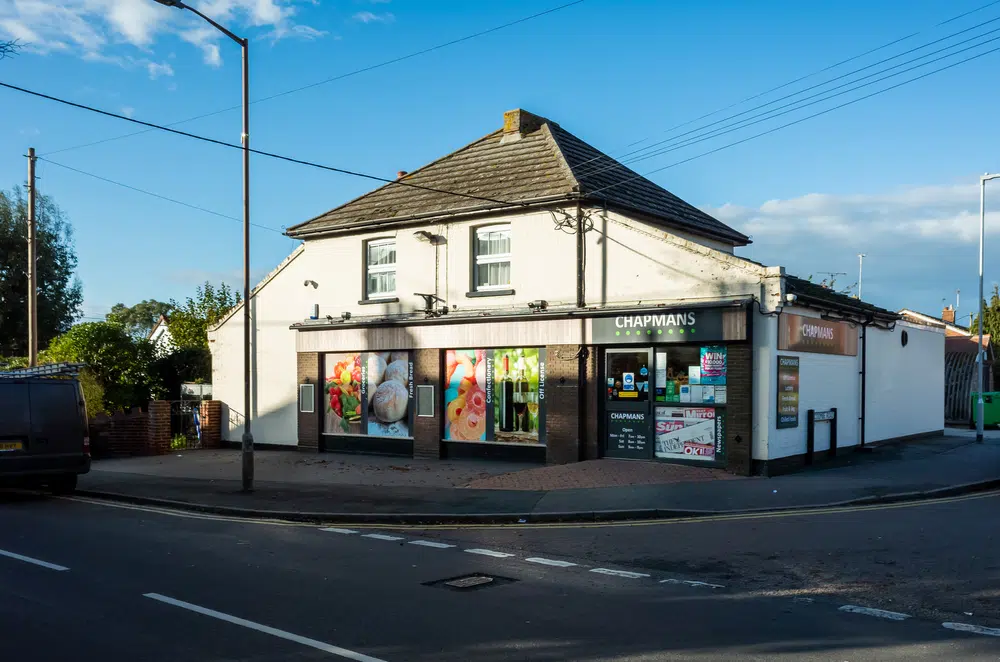 Small independent food stores are not doing well at the moment, so its possibly a good time to buy a convenience store while the sale costs are low. The fierce competition between supermarket giants for Britain’s food shoppers makes them an endangered species.
Small independent food stores are not doing well at the moment, so its possibly a good time to buy a convenience store while the sale costs are low. The fierce competition between supermarket giants for Britain’s food shoppers makes them an endangered species.
As they increase stock levels and squeeze prices in an effort to provide the perfect all-in-one shopping experience, local butchers, bakers, and greengrocers are finding it increasingly difficult to survive.
The local storeowner is not completely out of luck, however. Local specialized food retailers are losing market share to a more hybrid breed, one that focuses on its location as much as its range of products – the convenience store.
Local retailers seem to be enjoying remarkably good sales at a time of economic uncertainty. Ten million customers visit convenience stores daily, according to the Association of Convenience Stores (ACS). This could be an appealing option for someone looking to buy a business.
What is a convenience store business?
In essence, convenience stores are shops that sell groceries. Food, household products, cigarettes, alcoholic drinks, and newspapers are available, as well as a wide range of other goods.
These stores offer an alternative to the out-of-town superstores, which serves a practical need. Customers rarely shop for a week at these stores. However, they primarily draw their business from impulse purchases, emergency purchases, and people simply getting the daily necessities, such as milk and bread.
With the decline of local specialist stores, convenience stores in remote areas have also become communities’ centres of activity. The Association of Convenience Stores (ACS) has more than 5000 members it offers its members help and advice in regards to any legal issues convenience store owners may have.
Who is it suited to?
Convenience store owners come in all shapes and sizes. Many people who are starting out in business want a business they can understand relatively quickly. Furthermore, retired bank managers and others who have come out of the professions are allowed to apply. Markets are good because they appeal to a wide range of people.
This business also has the advantage of allowing you to enter without any prior retail experience. There are often ways to arrange a settling in period at the beginning if you are unsure about diving right in.
Putting in the hours will also be required. When the superstores are closed, many convenience stores stay open to attract business. Superstores are only permitted to open for six hours on Sundays, so this is especially important. The dawn chorus will wake you up if you are selling alcohol at night, while if you are delivering newspapers, you will need to be up as early as possible.
You may be struggling to cope even if you keep your day short. The business would be ideal for a couple who are willing to work long hours and alternate between running the front and back offices. You should make sure you are ready to share your business and your personal life, however. It can put a lot of pressure on a relationship.
Before you buy a convenience store
To become a convenience store owner, you need to look for a suitable business to buy once you decide the life of a convenience store owner is for you. You will have to make a number of decisions along the way, but it seems simple.
The first question is: where do you wish to be located? In addition to where you want to run your store, do you want it in a suburban area, a rural area, or in a town? When a store is located in a rural village, it often becomes the focal point of the community. As a result, you will have to do more than just stock food and drink. You may also have to act as a newsagent, baker, post office, and even a video store. You will become part of the community and play an important role.
If you locate in a more populous area, however, you may not need to offer many of these additional services, allowing you to concentrate on providing food, drink, and cigarettes.
A freehold or leasehold business will also affect the price, and how much you can borrow. Since a freehold business is owned outright, it is more expensive. Besides paying the initial purchase price, leaseholds typically require ongoing payments to the landlord.
Regardless of which option you select, you will more than likely need to approach a bank or commercial mortgage provider for funding. How much of the financial commitment are you responsible for?
How much does it cost to buy a convenience store?
The cost to buy a convenience store including the leasehold is £35-£45,000, depending on which part of the country you are buying in.
However, it is typically between £35,000 and £1 million. The largest expense is usually the cost of inventory, which can range from £20,000 to £200,000. Other costs include the cost of fixtures and equipment, which can be anywhere from £10,000 to £100,000.
The final cost will also depend on the buyer’s financing options. For example, if the buyer takes out a loan to finance the purchase, they will need to pay interest on the loan.
In addition, the buyer may need to pay stamp duty and fees. Ultimately, the cost of buying a convenience store depends on a variety of factors.
Things to look out for when buying a convenience store?
There are a few things you should look out for when buying a convenience store.
The location
The location is important for any convenience store. First, it’s close to public transportation which is important for passing commuters heading into work or school. secondly, there are a lot of fun things to do nearby like go to the park, Concerts and more.
The bottom line
The bottom line is important, its always best to get an accountant to check over the figures first before you commit. The importance of tracking the different revenue streams as they often carry varying margins and turnover figures can be misleading. For instance, while the sale of groceries may attract an average margin of 20%, tobacco could run at just 7%. Some items, like ATMs, are commission-based and will need to be recorded separately from other sales. Be sure to map turnover and profit against outgoings such as rent and rates.
Footfall
Its worth while checking out the store on different days and at different times to gauge the footfall of the business. It may look a great great spot with good parking but what’s access like during rush hour and how busy is it in the evenings? Be your own mystery shopper and make a few purchases using different payment methods. Are the staff helpful? Is the store being run well? – is there room for improvement? The more information you can gather about the condition of the business, the better placed you’ll be when it comes to negotiations.
Potential
Does the store have potential for a new revenue stream or to increase existing sales with just a few tweaks? It may be possible to increase your turnover significantly simply by extending your opening hours or introducing new products and services. Its worth checking supplier costs and the sales turn of higher-margin goods. It’s important to give customers as many reasons as possible to come into your store and buy.
The area
What is the area like that the store is situated in? Most of us would like to run a store in a safe area with a relatively low crime rate. If you think this would be a deal-breaker for you, it’s important to check out the neighbourhood of every store that piques your interest. Find out as much as you can about the area by looking at the crime statistics, ask around and make your own observations of the surrounding area to help you build up a picture of the store and its environs. It’s important to feel you’d be happy living and working in your new store.
What are the earnings potentials of a convenience store?
The management of a convenience store can be profitable, even if it won’t make you a millionaire.
You should also take into account the savings that can be made if you live over the store and have access to cheap food and supplies – the owner of one store said that he never realized how much it would cost. A second disadvantage is that, because your time will be spent in the shop a lot, you won’t have the opportunity to spend it.
Decide which products your convenience shop will sell
Before you can decide which products your convenience shop will sell, you need to understand your target market. Who are the people who live or work near your store? What do they need or want?
Once you have a good understanding of your target market, you can start to select the products that will appeal to them.
For example, if your target market is young families, you might want to carry child-friendly items like diapers and baby food. If your target market is busy professionals, you might want to carry items like coffee and pre-made meals.
By carefully selecting the right products, you can ensure that your convenience shop meets the needs of your target market.
- reduced the amount of space given to general groceries and household goods
- concentrated on ‘top-up’, emergency and impulse buys
- introduced fresh products, fruit and vegetables and food-to-go. Some have expanded the range of organic products and local produce stocked
Items typically sold by c-stores include:
- staples such as bread and milk
- snacks, cakes, sandwiches, take-away food, fast food, chilled ready meals
- a range of dairy products like butter, cheese, yogurts and other desserts
- alcohol and soft drinks
- coffee-to-go and other hot drinks
- fresh fruit and vegetables
- newspapers and magazines
- cigarettes and tobacco
- confectionery
- a small range of essential household and grocery items such as pet food, toilet paper, tea and coffee and so on
You might also wish to stock a range of Fairtrade products such as sugar, tea, coffee and fresh fruit.
Customers may only spend a small amount of money on each visit, but ideally they will pop in and out of your shop frequently.
Added extras for convenience stores
There is no such thing as a convenience store that does not offer many services. You can make your convenience store more appealing by including these ingredients:
Lottery tickets
You can buy tickets for all National Lottery draws and Instants at some outlets, but only Instants at others.
You must have a shop floor of at least 750 square feet, over 750 customers per day, and be open from 9am-6pm daily, including 7.30pm on draw days. Due to the lack of increasing numbers of outlets, new opportunities only arise when an existing outlet’s contract is terminated, for example for not meeting sales targets or for breaking lottery rules. From the candidates it has on file, Camelot selects a replacement.
The machine is free to install and train on. There are no ongoing expenses associated with the machine.
Retailers make 5% commission on every sale and 1% on every prize payout over £10 and below £200. Independent online retailers earn an average of £8,187 per year.
Cash Machine
An ATM allows you to give your customers instant access to cash.
There are a number of different companies that supply ATMs to independent retailers, including Moneybox, CardPoint, and InfoCash.
Shops must rent ATM machines from ATM providers. Some providers charge as much as £100 per week.
A commission is earned by the store for every transaction. Moneybox, a provider of ATMs, claims the increased footfall and spending will result in an 8-15% increase in revenue.
In-store bakery
The practice of buying frozen, part-baked bread, cakes, and pastries, so they can be prepared as freshly baked goods the next morning.
Delice de France and Le Pain Croustillant are suppliers (which also provide a cabinet, signs, labels, and training).
The part-baked bread costs the same as any other supply. However, if you need a bake-off oven, you can expect to pay up to £1000.
It is believed that the aroma of freshly baked bread encourages shoppers to shop, resulting in an increase in general sales.
Buy an existing convenience store
There are many benefits to buying an existing convenience store. For one, you will already have a customer base in place.
This means that you won’t have to spend as much on marketing and advertising to attract new customers.
Additionally, an existing store is likely to have a good reputation in the community, which can help bring in new business. And finally, an existing store is likely to be well-stocked with the products that customers want and need.
So if you’re looking for a turn-key business opportunity, buying an existing convenience store is a great option.
Ask your accountant to critically look at the business accounts for the past three years and discuss with them the selling price in the light of what the accounts reveal.
Make sure you include a budget for other professional fees such as legal fees and valuation and survey costs.
Contacts for support buying a convenience store
We will now pass the information of a few useful contacts on to you.
The Association of Convenience Stores
Represents both chain and independent convenience stores. Publishes an annual yearbook. Members are able to negotiate deals on shop insurance, medical insurance, finance, etc.
Membership: £50 per year for single shop
Website: www.cstoreretailing.co.uk
Telephone: 01252 515011
Alliance of Independent Retailers
An organisation of independent retailers representing 18,000 members. They also offer free legal advice, insurance deals, and copies of Monthly Trade magazine, “The Independent Retailer”.
Membership: £50 per year + VAT
Website: www.indretailer.co.uk
Telephone: 01905 612 733
Further reading
Convenience store sector trends in 2023
Jarred Musson is a versatile writer with a diverse educational background and a passion for all things business. Holding a Master of Science (MSc) degree in Marketing and a Bachelor of Arts (BA Hons) in Multimedia Journalism from Manchester Metropolitan University, Jarred possesses a unique blend of expertise that allows him to dissect and communicate complex business topics with clarity and precision.


